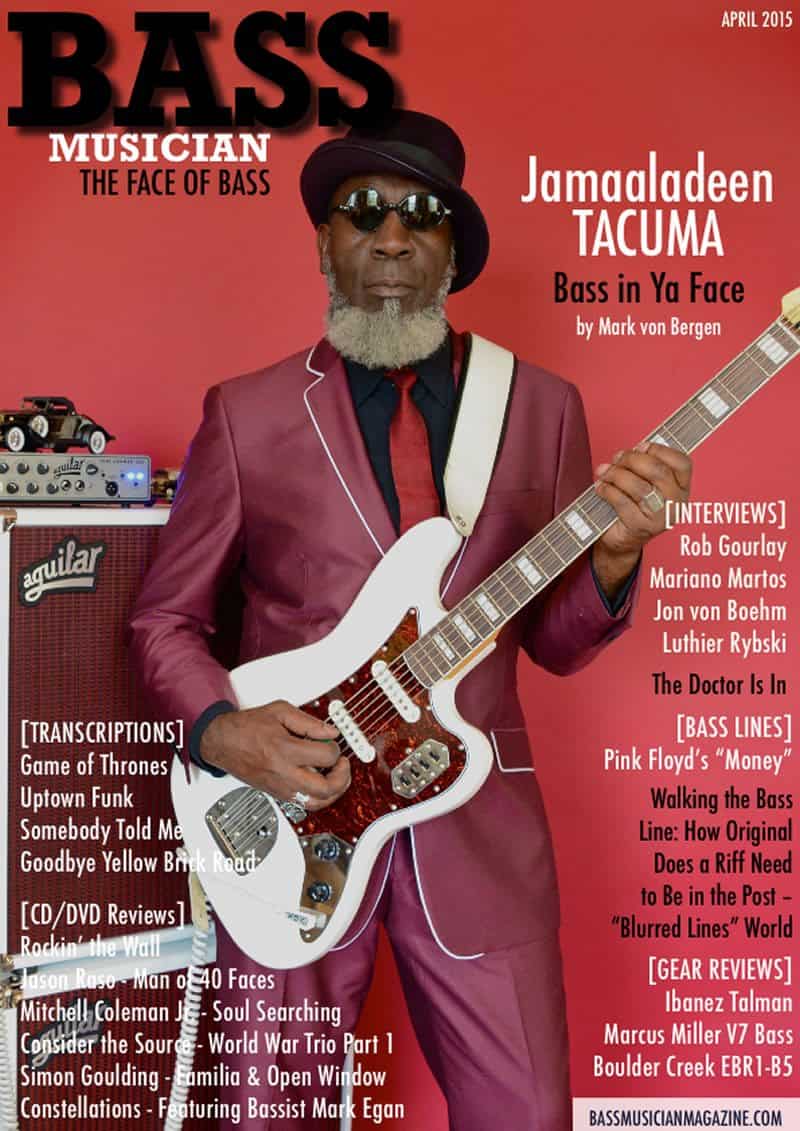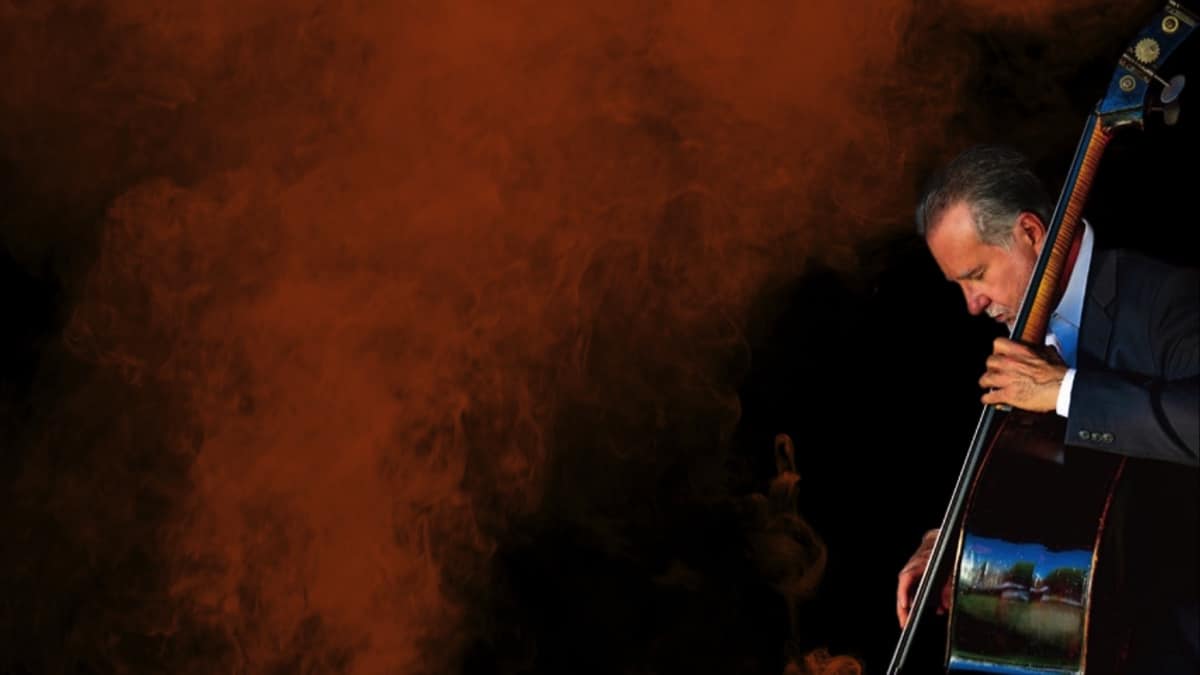Cover
Jamaaladeen Tacuma – Bass Musician Magazine, April 2015 Issue

Jamaaladeen Tacuma: Bass in Ya Face – An Interview with the Pioneer of Free Funk Bass…
Since being thrust on the jazz scene when he joined the legendary saxophonist Ornette Coleman’s ground-breaking and controversial electric band Prime Time at the age of 18, Jamaaladeen Tacuma has been heralded as the “baddest electric bass virtuoso in years,” “always…ahead of the average hipness curve,” and by Ornette himself as the “master of the sequence.” He has toured the world with Ornette and more recently with bands such as the Free Form Funky Freqs with Living Colour guitarist Vernon Reid and G. Calvin Weston on drums, Brotherzone with Jean-Paul Bourelly on guitar and Ronnie Burrage on drums, the Young Philadelphians with guitarist Marc Ribot, and various projects with Austrian saxophonist Wolfgang Puschnig. He appeared with Prime Time on Saturday Night Live in 1988 and one night acted as musical director of the Tonight Show Band. He is active as a producer, writer, and arranger. He also somehow finds time to design his own hollow body electric bass, the TacumArt, and to run his Redd Carpet Room, which features stylish clothing procured from around the world. He has become a master of social media. His Facebook page is active and informative, and his website jamaaladeenmusic.com makes available for purchase his recent recordings and contains links to YouTube videos, of which there are many. Also check out Soundcloud for some samples of his projects and follow him on Twitter. Finally, he recently completed several artistic residencies, including at the MacDowell Colony in New Hampshire, Headlands Center of the Arts in California, and Civitella Ranieri in Umbria, Italy.
As incredibly busy as he is, we were lucky to connect with Jamaaladeen by phone at his home in Philadelphia for this interview in February. It took about a year to arrange the call and was well worth the wait. The interview has been edited for clarity and brevity. And imagine plenty of laughter punctuating Jamaaladeen’s comments. He is as generous and fun – and funky – as his music.
[Mark] What projects are you working on right now, and what have you got coming up in the future?
[Jamaaladeen] Yeah. What’s happening right now is that the Jam All Productions label that I started several years back is pumping out things yearly. In 2011 we released “For the Love of Ornette” featuring Ornette, and there’ve been releases since then with Brotherzone and this year another recording called “Legend of The Pipe & Sweater,” which is based on the collaboration that I did with some musicians from Copenhagen. Now I’m working on releasing a collaboration with all-Philadelphia musicians titled DNA Galleria based on a residency that I held in a club here in Philadelphia called Tritone where I would have these improvisational collaborations once a month. Also this year we plan to release a recording I did with some hot young Tokyo musicians from a band called the Ethnic Minority which mixes electronica, house, rock, and funk. It’s co-produced and engineered live in the studio by the famous Seigen Ono, who worked on “Merry Christmas Mr. Lawrence” and “The Last Emperor” with Ryuichi Sakamoto.

Photo: Sound Evidence
[Mark] You’ve recently been working with the Young Philadelphians, the Free Form Funky Freqs, and Brotherzone. What else do you have coming up?
[Jamaaladeen] The collaborations that I’ve done with my longtime friend, Austrian saxophonist Wolfgang Puschnig. He has a group called Alpine Aspects, which includes a brass band from Austria, where we collaborate on traditional Austrian melodic themes and rhythms with jazz-influenced grooves.
[Mark] Is there anything that you’d like to do in the next five or ten years, playing with people that you haven’t played with, or that you haven’t played with recently?
[Jamaaladeen] There are a lot of folks I’d like to work with, but the thing about is, I’m always called to work with a lot of people, and what I also like to do is work with my own situations. Sometimes it’s a little bit difficult because folks are always calling me to support them; I feel really blessed and fortunate to be able to assist and support those other artists that call up, because I look like sometimes an actor will be a supporting actor. And sometimes that supporting actor is only interesting in that; when you look at a movie, you see that guy or girl a lot—“I just saw that guy in that movie, I just that girl in that movie!”—and they’re always popping up, and that’s how I look at myself from time to time. You know, once on stage with an artist and I give them 100% of what I have to offer, I can’t get rid of them.
It’s a blessing and curse at the same time. It limits me from doing all of my stuff. You know, I have tons of ideas that I’ve been working on for years, and I’m always trying to find that opening, that window, to do my stuff as well. But I’m appreciative of it all.
[Mark] Can you tell me about your recent artistic residencies?
[Jamaaladeen] They were really interesting in that I was in a setting where I was really able to concentrate on my work and concentrate on my craft, and put myself in a situation of discipline where I wasn’t affected by things that were surrounding me normally in my home situation—children, family—and I was able to compose, arrange, and just collaborate with some of the other people that were there. The Italian residency was really interesting in that I put together all of the artists. I mean, it’s a very interesting thing when you can sit together at a dinner table with an architect and talk about architecture and talk about your composing, and talk to a photographer about their photography work, and talk to a science writer; we built a relationship that I was able to create from. I actually got them all together in a recording—it might have been the first situation that’s ever been done—a recording that I produced in Italy at the Civitella Ranieri, that’s the name of the castle where the residency was held, and there I put together a project I called “Civi Chill.” And Civi Chill is basically a collaboration of all the artists that were there. So you ask, “How does a photographer translate himself into a recording?” I asked them to write all of the things that they wanted to express from a writing standpoint based on their work. From that, I created musical rhythms and musical melodies and compositions to go along with that. So, aside from the things that I was working on personally, I took on the role of producer even out there, putting together that project.

Photo: Sound Evidence
[Mark] Let me switch a little bit to the topic of Philadelphia, which I assume is where you live now….
[Jamaaladeen] Yeah, I’ve lived here all my life.
[Mark] I just saw Christian McBride in concert, and he talked about the fact that he was in a band in a Philadelphia high school with QuestLove, Joey DeFrancesco, and Kurt Rosenwinkel. In addition to McBride, there are an incredible number of well-known bassists from Philadelphia in addition to you: Stanley Clarke, Paul Chambers, Alphonso Johnson, Gerald Veasley, Victor Bailey, Robbie Baker, Anthony Jackson, Tyrone Brown, and Jaco Pastorius, by way of Florida. So, why Philadelphia?
[Jamaaladeen] Tyrone Brown told me just the other day an old saying: “It must be in the water.”
[Mark] Did you feel pressure to play bass living in Philadelphia?
[Jamaaladeen] Not at all. I didn’t even know as I was coming up that Philadelphia had such a long history of bass players. I didn’t know that until later. And I felt really proud to be amongst that group, but I didn’t really know that until later on.
[Mark] What was the music scene like in Philadelphia when you were growing up? What influenced you? Were you listening to R&B, or the Philly sound?
[Jamaaladeen] Before I was even introduced to jazz or classical music or improvisational music, I grew up listening to soul music and R&B, and later funk, as they say. There was a theater here in Philadelphia called the Uptown Theatre, which was just like the Apollo Theatre in New York, which was just like the Howard Theatre in Washington, D.C., and just like the Regal Theatre in Chicago, where all of the R&B groups would tour. And they called it, as you might know, the chitlin’ circuit. So, at the Uptown Theatre, I would see all of the groups that were popular and had songs playing on commercial radio at the time. I saw James Brown, the Temptations, all of the Motown groups, all of those artists coming out of New York, groups coming out of Chicago, the Five Stairsteps, and all the groups that were really popular, doing R&B stuff. And I really, really loved that stuff; it was part of my DNA. And then came the Philly International sound. But before the producers Gamble and Huff made Philadelphia International a success, they were writing together and collaborating with a lot of artists already. They were recording Jerry Butler and Billy Paul and a group called the Intruders—and they worked along with the producer/arranger named Thom Bell, who had an incredible concept of arranging and composing and producing. And Thom Bell was a huge fan of Hal David and Burt Bacharach. So when you listen to groups like the Spinners, the Delphonics, the Stylistics, you will hear a lot of this Burt Bacharach/Hal David influence that Thom Bell brought to Philadelphia International Records.
Those were the things that influenced me. Because even though I played with Ornette Coleman and did all of that interesting improvisational stuff, it boggles people’s minds when I tell them that my early roots were R&B.
[Mark] Was the band Catalyst from Philadelphia before or after you?
[Jamaaladeen] Catalyst was before me. I remember Tyrone Brown invited me to a Catalyst recording session, and there were Tyrone Brown and Alphonso Johnson playing. And the rhythm section, which was Tyrone Brown, Eddie Green on piano, and Sherman Ferguson on drums, went on to be the back-up group for guitarist Pat Martino, another Philadelphian, for years.
[Mark] How did you connect with Ornette, and what was that experience like?
[Jamaaladeen] I was introduced to Ornette by guitarist Reggie Lucas and percussionist James Mtume who were at the time with Miles Davis. They were both from Philadelphia, and they knew me as I was coming up as a young guy playing, and they recommended me to Ornette who was looking for a bass player. I went to New York to audition and basically Ornette just wanted me to play. After the first song, he asked me would I mind going to Europe for two weeks, and I was like “Yes!” And that two weeks wound up being six months. So that was a very interesting beginning for me. We were based in Paris, and we would have concerts all around Europe and come back home to Paris as our base. And we rehearsed there, and that is where we recorded “Scenes from a Symphony” from “What’s Dancing in Your Head.”

Photo: Sound Evidence
[Mark] At one point on your recording “For the Love of Ornette,” Ornette is heard telling the musicians, “Forget the notes and just get to the idea.” What did he mean by that?
[Jamaaladeen] Well, you know, that was actually a gift to me. During the recording, I did not want Ornette to have to think about anything. Ornette never thought of himself as a leader, although he was the leader in terms of the commercial idea of a band; he was a leader, yes. But musically, he never thought of himself as out front. He always thought of himself as being within the sound of all that loudness that you heard.
In more Western forms of music and arrangements, you have the soloist out front and the band in the background. He always felt as though he was inside of the sound. That was a big thing for him. So, 35 years later, when I was doing my record, “For the Love of Ornette,” and I invited him to play with me, that’s the role I wanted him to play. I didn’t want him to write any new music for me. I wanted him to be right inside of the compositions I had written. And so, it was a gift to me when we first started the session that he made that statement. He would always say things like that at Prime Time rehearsals. So for him to say, “Fellas, fellas, forget the notes and get to the idea,” was based on the compositional improvisational approach to harmolodics. Unlike in Western music where the arrangement is set in a certain way, with the harmony being here, the melody there, the rhythm being there, in harmolodics, all of those components are moving in the same direction simultaneously. And so, at that point, the melody of the composition is the most important factor.
Ornette never said that he played “free jazz.” This is a term that folks made up. But he always thought of himself as being a compositional improviser. The melody was always the strongest point. So, the idea of a compositional idea, a melodic idea, was more important than a riff. It was more important than an ongoing, regurgitated, copied fragment of something—the musical idea was the most important thing to the composition. And when you play those musical ideas, they become the basis of the composition. Anything that you play less than that is not acceptable because it doesn’t add to the music; it doesn’t take the music further. Anything that you play should be equal to the melody, or stronger. The melody, no matter what it is, is the focal foundation that’s going to allow you as an improvisational artist to move and to morph. In compositional improvising, one comes up with their own bridges, which makes the movement.
So your musical ideas are based on the composition or the melody, and that’s why we all had to know those melodies. It wasn’t like an idea like, you know, the band just got up there and (mimics the sound of chaotic music). No, we knew exactly what we were doing in terms of those melodies. We knew them inside and out – we rehearsed them daily. We were probably working on a song for a whole day, you know? And the ideas that you came up with later were what made the composition interesting. So the notes had nothing to do with that. It was more the ideas. So when Ornette said “Forget the notes, get to the idea” – that’s basically what he meant.
[Mark] What is the story behind “Tacuma’s Song,” which Ornette wrote for you and is featured on “For the Love of Ornette” and earlier recordings?
[Jamaaladeen] Oh, okay! It’s a beautiful song, I mean, that’s one of the reasons why 35 years later I wanted to do something for him, because early on, when I was doing my first recording, “Showstopper,” I came to him and I said, “Write me a song, Ornette!” And he graciously said yes, no problem. I came to the rehearsal, and he had it ready. It was called “Tacuma’s Song,” and I was like, “Wow!” That is really special! A song is a song, but to have a song named “Tacuma’s Song”—that was really over the top; it was really a blessing and an honor. And melodically, I think he got inside my soul! He knew the melody would allow me to improvise in a way that I could just go on and on forever. When we recorded “For the Love of Ornette,” we did an arrangement of that for a band. Before, it was always a solo situation; that was the first time it was done in a band situation, and he was inside of it. So you actually heard him playing exactly what he heard weaving and bobbing and moving in and out and creatively coming up with those ideas within that sound because he understood that sound completely. And that’s what he loves to do.

Photo: Sound Evidence
[Mark] John McLaughlin recently said that there’s no recording industry any more, and despite having a reputation, he’s lucky to make back the cost of recording the album. And Marc Ribot has been vocal about the same thing—he finds himself touring to make a living at the expense of creating and recording. What do you tell young musicians, especially bass players, about making it as a musician today?
[Jamaaladeen] There is a workshop master class that I do entitled “Music and the Human Experience.” And in that master class, I share information with them that was not readily available to me as I was coming up. The music business has definitely changed. And being independent, which is something we always talked about in the 80s, has definitely come to a certain fruition with social media and the idea of doing it yourself. When the bass players come to the master class, they’re all starry-eyed and this and that and the other. I tell them, “Listen, some of you are going to be great bass players, and some of you are not.” And they go, “What is he saying to us?!?” The organizers of the event are like, “What is he telling them??” I tell them the deal is this: The music business and music are two different things. Some of you are going to follow this road, which is going to lead you to many different directions. Some are you aspiring to be bass players, but you know what? Some of you are going to be music producers. Some of you are going to be writers. Some of you are going to be promoters. And that has nothing to do with your bass playing; it just means that as a human being, you’ve found another way of expression and another way of making a living. A lot of times the musicians who have their names in lights have more problems than the person who has the day job who is eating regularly, who’s making a living for himself, taking care of family, and being a basic human being. You have to be a human being first before you can be anything. I always tell the young musicians, “Listen, stay close to family, take care of your health, watch your business, and the social media scenario will allow you to be independent where you don’t have to wait for a record company.”
I can make my CDs and promote and sell them. If I sell my CDs at a concert, I’m going to get that money directly and immediately. I don’t have to wait for a label to say, “Oh yeah, the check is in the mail.” If they’re putting up $20,000 for a recording – compared with spending maybe $5,000 recording it myself – before you get any money back, all that money has to be paid back, and you might not see anything. And if you’ve got an idea about an aesthetic, a certain design where you are making it look good and making it sound good, you’re way ahead of the game. Don’t wait to be signed by a label – get out and do your own thing. When you put out a project, you can control it; you can let it, as they say, “do what it do.” If you want to wear a polka-dot facial mask, do it.
I’m so glad, and I feel so blessed and so honored, to be able to be just a part of this sort of revolution. Now, you know, most people are complaining about the industry because the industry is based on b.s. – “If you’re not selling records, we’re not going to get behind you. If you’re not showing your ass, we’re not going to get behind you.” All of that has more to do with the commercial situation than the music. And it doesn’t mean that if an individual musical artist is not famous, he’s not important. Every human being is important in what they do, in what they express. So if this person makes $10,000 and I’m only making $1,000, am I going to be upset with that person? No, as a human being, I should be happy for that person. One who believes in God or the Creator has to believe that whatever that they are blessed with is from the Creator, and if you are blessed with it, there is nobody or nothing that can take that away from you. And if you are not blessed to have it, there is nothing or nobody that can give it to you. And so the superficiality and the plasticness of the business that keep people in a tailspin—that’s not what music is about, you know? So I suggest to any young musician to get into what they are about. Show themselves how they want to be seen, and handle their business affairs accordingly.
I know musicians who have day jobs because they want to take care of their family. I applaud them because I think that some musicians live in a world of fantasy believing that the most important thing is music and playing, and not family life. Family life has to be maintained with finance, and family life helps promote being a whole human being. When this is in place, your art can take shape and blossom. The concept of the starving artist is corny to me. God forbid, if something were to happen to my fingers, I hope that I would use my intellect to move into other fields of music that are still satisfying. Perhaps work as a producer or an arranger, or publish a book on fashion and style.
McLaughlin and Ribot find themselves in a situation where their records are not being promoted for them as they once were. My suggestion to them, as well as any musician who is going through this, is to come up with a strategy to counter the new industry business model. A young musician may want to enlist the help of an intern to facilitate promotion of projects on their production roster. I think one has to be satisfied with what they have been blessed with in terms of the work they have put out. That’s a very spiritual outlook. If I’m able to sell 500 units, and not what the numbers I did in the past, as a mature artist now, that is a blessing. Whatever you’re able to do, it’s for you. If it’s for you, it’s a blessing; and if it’s not for you, it’s not for you. At the end of the day, I’ve got tons of folks I know who have been in the business for a long time who have gold and platinum records, coming to me and saying, “Jamaal, I would love to play like you play,” or “I would love to do what you do!” And for me, it is more important to be real to myself, and to be consistent in this ever-changing music and business world.
[Mark] Early on you were associated with the Steinberger bass, but now you’re kind of going for that vintage sound, and you designed your own bass, which Chris DiPinto assembled. What basses are you playing today?
[Jamaaladeen] Let me explain something to you: I’m not stuck on anything. I have my fingers; my fingers can do the talking based on what I want to express, and I’ve never been the kind of guy that, you know, like if it’s not a certain kind of bass, I can’t play. As long as the strings aren’t 50 feet above the neck, I can get into it. I’m just enjoying the idea, man, of being able to utilize any and every sound palette that I want. I’m not going to wear the same pair of pants every day. I’m not going to wear the same color every day. I’m not going to eat the same food every day. Life is too beautiful. Life is too big to be stuck in that type of thinking. I’m just enjoying myself, man. You know, the old-school Fenders? I love them. I love the Steinberger. I love the TacumArt bass that I’m designing. The music demands different colors. I don’t want someone to listen to a record and say “Oh, that’s Jamaaladeen.” I’d rather have somebody say, “Well, who is that playing? Let me listen to it a little deeper….Oh, that’s Jamaaladeen. I didn’t know that he sounded like that on a six-string Squire. [See this issue’s cover where Jamaaladeen is pictured with a Squire VI.] Or, I didn’t know he sounded like that on a fretless. Wow!” That to me is more interesting than being pegged.

Photo: Sound Evidence
[Mark] Speaking of colors, tell me about your Redd Carpet Room.
[Jamaaladeen] The Redd Carpet Room is an extension of my passion for style, design, and fashion. That is something that has been a part of me from early on. It is something that I saw at the Uptown Theatre. Because mind you, those guys in the 60s and 70s, when they would come on stage – Woooo! Killin’! And if you were in the audience, man, your mind was blown, not only because of their musicianship, but also because of what they were wearing, what they were rockin’—you know, the colors, the fabrics, the way the fabric accented the lighting that was on it. All of that stuff is theatrical, all of that stuff is staged, but it has nothing to do with superficiality; it has to do with a stage presence. I grew up in the African-American neighborhoods. We didn’t have a lot of money, but we understood design, we understood style, and we would run with that. We were wearing things from Elsa Schiaparelli, the Italian designer. We were wearing shoes from Switzerland. We didn’t know how to pronounce everything, but we knew that we loved it, we knew how to wear it. When I start going to Europe, I start checking out European designers, asking about the design, the choice of fabrics. So, the Redd Carpet Room is an extension of those design ideas; it’s a place where I can let guys come and purchase clothing pieces that are good for them on the street and on the stage. So I provide that service as a stylist. And it’s a fun thing—they come here, they get what they need, and they look great when they walk out.
SELECTED DISCOGRAPHY
(check www.jamaaladeenmusic.com for the availability of Jam-All Productions recordings in digital and CD formats)
As a leader
Legend of the Pipe and Sweater, Jam-All Productions
For the Love of Ornette, Jam-All Productions
The Dream Then and Now, Jam-All Productions
Coltrane Configurations, Jazzwerkstatt
Groove 2000, P-Vine
Brotherzone, P-Vine
Dreamscape, DIW
Boss of the Bass, Gramavision
Jukebox, Gramavision
Music World, Gramavision
Renaissance Man, Gramavision
Showstopper, Gramavision
With Ornette Coleman
Dancing in Your Head, A&M/Horizon
Body Meta, Artists House
Of Human Feelings, Antilles
Opening the Caravan of Dreams (with Prime Time), Caravan of Dreams Productions
In All Languages (with Prime Time and the Quartet), Harmolodic Productions/Verve
With Free Form Funky Freqs
Urban Mythology Volume 1, Thirsty Ear
Bon Vivant, Jam-All Productions
With Basso Nouveau
All Basses Covered, Moers Music
The Night of Chamber Music, Moers Music
With Burhan Öçal
Groove Alla Turca, Doublemoon
With Wolfgang Puschnig
The Flavors of Thelonious Monk Reloaded, Jam-All Productions
Journey Into the Gemini Territory, ITM
Gemini Gemini, ITM
With David Murray
Rendezvous Suite, Jazzwerkstatt
With Uwe Kropinski
Zwei, Jazzwerkstatt
With James Carter
Layin’ in the Cut, Atlantic
With Derek Bailey & G. Calvin Weston
Mirakle, Tzadik
With James “Blood” Ulmer
Tales of Captain Black, Disk Union
With Cornell Rochester
Meet the Podium 3, Timeless
Visit online at jamaaladeenmusic.com
Bass Videos
Brian Bromberg, Paying Tribute to Scott LaFaro – April 2024

Brian Bromberg, Paying Tribute to Scott LaFaro, April 2024…

Brian Bromberg is one heavy-hitting bass player and I am in awe of his talent as one of the few individuals who is equally proficient on electric and upright bass.
You might remember our conversation back in 2018 when he released his powerhouse Funk album. Brian’s “A Little Driving Music” album is a staple on all our road trips and his Jaco and Jimi Hendrix tribute albums are mind-blowing… and I could go on and on.
Now, Brian has taken on the arduous task of producing an album paying tribute to the late, great, Scott LaFaro. He teamed up with pianist Tom Zink and drummer Charles Ruggiero and Brian delivers a commanding performance on upright. The entire album is a masterpiece and a real treat to listen to track after track.
Join us as Brian shares the details behind this project and more.
Photo, Michel Bocandé
Featured Videos
Visit Online
brianbromberg.net
FB @BrianBrombergBassist
YouTube
Cover
Leland Sklar, Over Half a Century of Bass, March 2024

We all have enjoyed Leland Sklar’s Bass lines for over half a century.

You might remember that we had him on our cover back in 2017 and did an update when he launched his book “Everybody Loves Me” in 2020. It was exciting to hear that The Immediate Family had got back together in the studio to work on their own music in 2019 and are now up to two albums.
Just last December, Magnolia Pictures released a documentary titled “Immediate Family” where we got a behind-the-scenes look at the massive contributions Danny Kortchmar, Waddy Wachtel, Ross Kunckle, Leland Sklar and Steve Postell have made in countless songs that are the very essence of our daily personal musical soundtracks. Seeing the astronomical roster of performers they have supported over many years is very eye-opening. It is a must-see for any music lover!
Now, I am thrilled to bring you a special chat with Leland Sklar where we go more in-depth into the bass side of his musical journey.
Photos: Header, Rob Shanahan – Cover Photo, Jay Gilbert/Chris Schmitt
Featured Videos:
Skin In the Game – https://www.youtube.com/watch?v=QhbnzIrdjJ8
from new album Skin In The Game
The Toughest Girl In Town – https://www.youtube.com/watch?v=UVQLZIRfLjU
from new album Skin In The Game
Fair Warning – https://www.youtube.com/watch?v=1DN18DYwLsU –
from the self-titled album The Immediate Family
Visit Online
www.immediatefamilyband.com/
www.facebook.com/TheImmedFamily
www.instagram.com/theimmedfamily/
Bass Videos
Ricky Phillips, STYX Bass And More – February 2024

Ricky Phillips, STYX Bass And More…

I have always been a huge Styx fan. Their music kept me awake during countless nights studying and gave my imagination a place to escape when I had a moment to take a break.
I had the immense opportunity to chat with STYX bassist Ricky Phillips for our August Cover in 2017 and follow his projects as time passed. Now, I am thrilled to have the opportunity to catch up with Ricky as he has been super-busy over the past six years.
Join me as we take a deep dive into the band’s most recent album “Crash the Crown” and EP “The Same Stardust”. Ricky shares some insights into the herculean team effort behind the scenes and the musical process that keeps them ever so busy and how he has updated his sound.
Without further ado… Here is Ricky Phillips!
Photo: Jason Powell
Featured Videos:
“Crash of the Crown” lyric video
“Reveries” lyric video
“Save Us From Ourselves” lyric video
“Sound the Alarm” lyric video
“Too Much Time On My Hands” Zoom video 2020
Visit online:
www.Styxworld.com
FB & IG @styxtheband
Bass Videos
Jeff Pilson, Foreigner Low End – January 2024

Jeff Pilson, Foreigner Low End – January 2024…

Those of us who were around back in the 70’s remember how certain songs on the radio resonated with us. It turns out that many of these iconic melodies came from Foreigner and they were part of our personal soundtracks!
After all these years, the band is going as strong as ever with Jeff Pilson firing away on bass midstream into a 2-year farewell tour.
I am excited to be able to bring you all the details about Jeff’s musical Journey, the farewell tour in progress, how he gets his sound and his plans for the future.
Cover Photo: Krishta Abruzziini / Video Photos: Krishta Abruzzini, Karsten Staiger, Gina Hyams
Featured Videos
For more news on FOREIGNER and upcoming Farewell Tour dates, fans can visit:
foreigneronline.com
facebook.com/Foreigner
twitter.com/ForeignerMusic
instagram.com/foreignerlive
youtube.com/user/FWebTeam
Also on FB @officialjeffpilson
Bass Videos
Rodney O’Quinn, Rockin’ Hard Through the Years – December 2023

Interview With Foghat Bassist Rodney O’Quinn…

Many rock fans have enjoyed music by Foghat, who originally formed in London back in 1971.
Over the many decades of playing, the band members have changed, leaving behind only Roger Earl as the only original member. Bassist Rodney O’Quinn left the Pat Travers Band and joined the group in 2015 and has been laying down the low end for this iconic quartet keeping the Foghat legacy alive. With a new album titled “Sonic Mojo” which dropped on November 10th, the band is as busy as ever and there is lots of very tasty music to come.
Join me as we learn of Rodney O’Quinn’s musical journey, how he gets his sound, and his plans for the future.
Photos:
Cover, Jake Coughlin
Video Thumbnail, Tom Apathy
Photos used in the video: Kerry Quinn, Chuck Lanza, Kim Granger, Kenneth Strohm, Jake Coughlin, Jay Jylika
Featured Videos:
1st Single from Sonic Mojo – Official “Drivin’ On”
2nd Single from Sonic Mojo – “She’s a Little Bit of Everything Official Video
“Road Fever”- California Mid State Fair – Paso Robles, CA – 7-27-22
“Stone Blue” – Rodney O’Quinn Bass/Lead Vocals – Don Odell’s Legends – Woonsocket, R.I – 10/15/22 – The Stadium Theater
The Earl’s Court – Season 2, Episode 7: Funny Guys
“I Just Want to Make Love to You” – CasinoRama – 6-9-23
FOGHAT “Somebody’s Been Sleepin’ in My Bed” – Mohegan Sun, Uncasville, CT – 1/28/22
“I Just Want to Make Love to You” – California Mid State Fair – Paso Robles, CA – 7-27-22
Visit Online:
www.foghat.com
www.facebook.com/Foghat
www.twitter.com/FOGHAT
www.instagram.com/foghat_official
www.youtube.com/user/FOGHATMUSIC



















